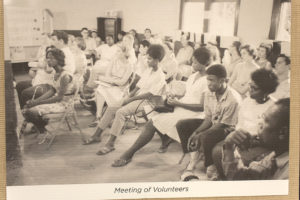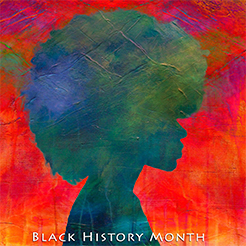Black History Month is a celebration of the achievements of African Americans and their role in United States history.
To celebrate black history, Sinclair has been highlighting important figures within black history on their Facebook each day.
They will also be playing the documentary “13” February 7 from 5:00 P.M. to 7:00 P.M.
Sinclair has a photography exhibit in the Library Loggia that showcases photographer Herbert Randall’s work which documented the Civil Rights Movement.
NBCNews released a list in honor of Black History Month of 28 of African Americans under the age of 28 who are influencing black history today. Included on the list is Simone Manuel, the first African American woman to win an individual gold medal in swimming at the Olympics.
Christen Johnson from Columbus, Ohio also made the list for being the president of the Student National Medical Association and working to establish bias training for doctors.
Chance the Rapper was shown on the list as well for his breakthrough in the music scene and holding voter registration at his concert tour stops.
2016 and 2017 have also hosted several films that have brought light into black history, like the Academy Award nominated films “Fences” and “Moonlight.” The documentary “I Am Not Your Negro” is a critically acclaimed documentary that shows the history of American race relations through the eyes of Civil Rights leaders.
Black history is a large component of the Miami Valley as well. Dayton and its surrounding area has played a role in black history for many years. They were also known for a large riot that broke out in 1966.
After the shooting of Lester Mitchell by a white man in 1966, Dayton’s largest riot broke out. 105 people were arrested and 23 people were hurt. Ohio’s National Guard was called out to the riot and a visit from President Johnson was almost cancelled due to the rioting, but he ended up showing up two weeks later. The riots cost the city an estimated $59,000.
C.J. McLin was a leading voice among the rioters. In November of the same year, McLin was elected to his first of 11 terms in the Ohio House of Representatives.
Former Dayton mayor Rhine McLin, C.J McLin’s son, has since said that West Dayton is worse than it was 50 years ago when the riots occurred.
After a long legal battle, a court ordered desegregation plan for Dayton took place in 1976 which was upheld by the U.S. Supreme Court in 1979.
Some of the people who made some historic firsts in Dayton was James Parsons, a scientist and an inventor who became the director of the America’s only all-black laboratory. He received more than six patents for the development of stainless steel.
James H. McGee was the first black mayor of Dayton. He held the post longer than any other mayor of Dayton. McGee opposed Interstate 675, which connected Interstate 75 and 70.
Warner A. Jackson became Dayton’s first licensed black dentist and Dr. William ‘Bud’ Burns became Dayton’s first black medical doctor.
Charles H. Wesley was the founder and first president of Central State University. William Jenkins became Dayton’s first black police officer in 1897.
Edwin C. Moses of Dayton won an Olympic gold medal in the 400-meter hurdles. Edwin C. Moses Boulevard was named after him.
For those who are interested in learning about African-American culture, Sinclair offers Africana studies and African American Psychology.
Laina Yost
Managing Editor

